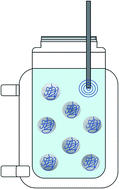In-line monitoring of latex-particle size during emulsion polymerizations with a high polymer content of more than 60%
Abstract
The photon density wave (PDW) spectroscopy is established in the fields of biochemistry and food chemistry as an online analytical method for the determination of mean particle sizes. This work examines PDW spectroscopy regarding its potential in high solid content emulsion polymerization. For this reason, emulsion copolymerization with a tendency for agglomeration of vinyl acetate and Versa® 10 in a molar ratio of 9 : 1, and with varying emulsifier content, was carried out in semi-batch operation mode with different target particle sizes from 50 to 325 nm. A redox initiator system, consisting of L-ascorbic acid, tert-butyl hydroperoxide and ammonium iron(III) sulfate, was used as a radical source. The mean particle sizes of PDW spectroscopy were compared with those of conventional offline measurement methods, such as dynamic light scattering (DLS) and sedimentation analysis, by means of a disc centrifuge. The determined mean particle sizes show a very good reproducibility and agreement between DLS and sedimentation analysis up to a polymer content of 36%, after which measurements were rendered difficult due to agglomeration. Nevertheless, PDW spectroscopy was able to continue providing reproducible measurements until reaching a polymer content of 63%.



 Please wait while we load your content...
Please wait while we load your content...